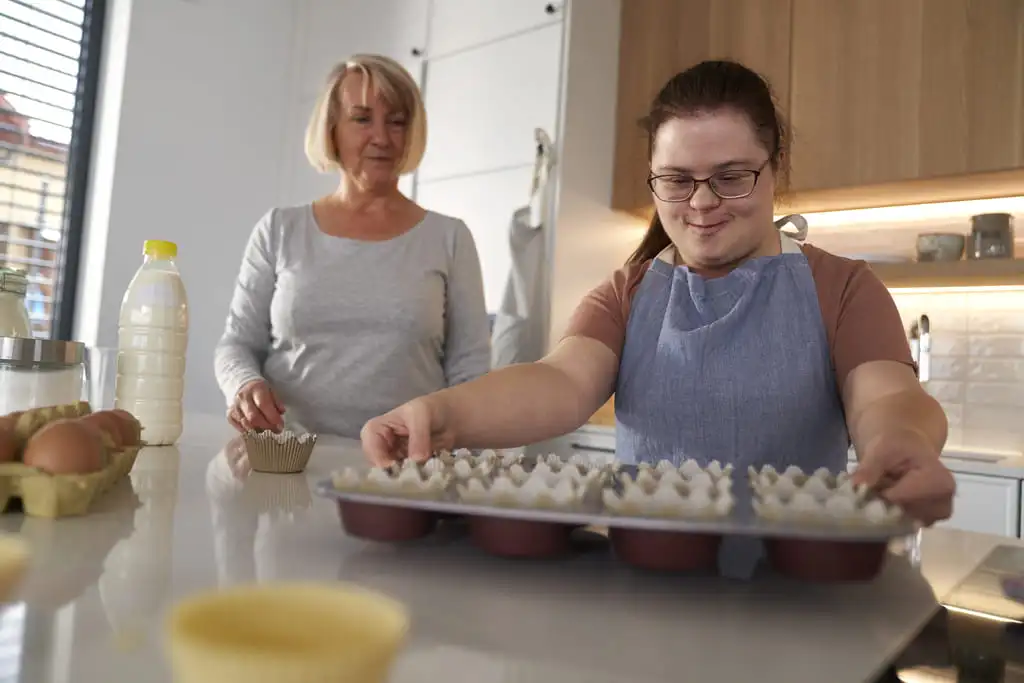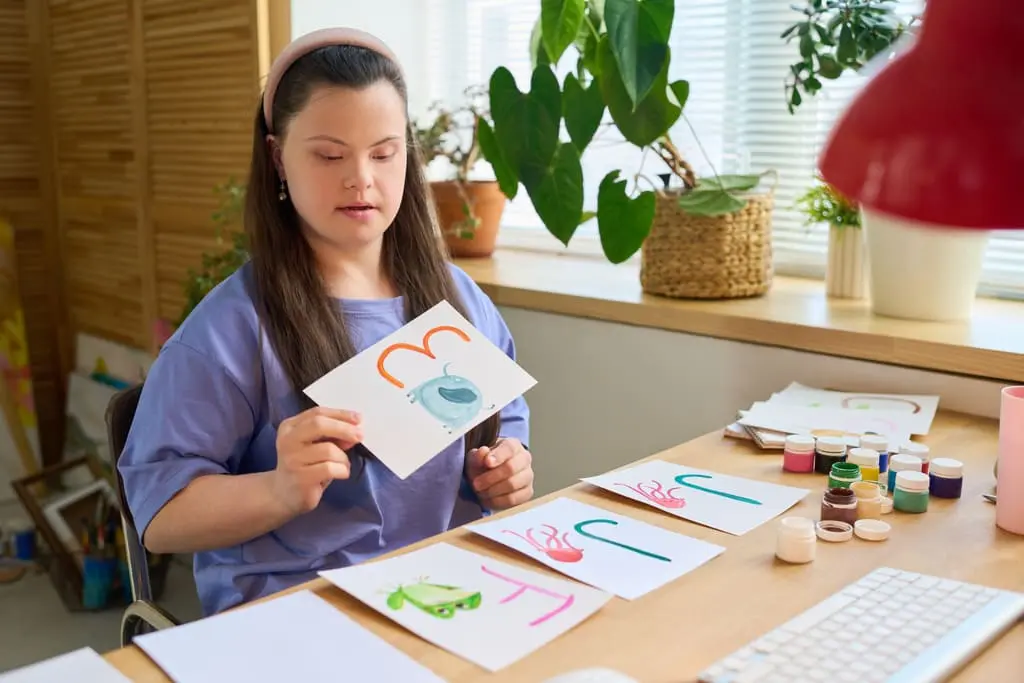What is a Person-Centred Approach?
Person-centred approaches support individuals in recognising and expressing their needs, abilities, and desires, empower them to make decisions regarding their lives, and provide the necessary support to achieve their objectives. The primary aim of person-centred care is to bring positive transformations in an individual’s life by enabling them to take control and fostering the development of their independence. A constructive start involves spending time with the individual and looking at their current life situation and vision for the future. This enables the development of person-centred planning that supports pursuing short and long-term goals.
By using circles of support and pathway plans as planning tools for individuals living with Down syndrome, support workers can easily identify their needs and create person-centred plans. When beginning initial planning, it is important to explore and understand various aspects of an individual’s life to ensure proper support. Healthcare professionals create solid relationships and, in time, get to know the true aspirations and needs of the individual. Individual needs and aspirations may revolve around the following aspects:

- Daily activities
- Health
- Family members, friends and pets
- Community involvement
- Education and employment
The Benefits of a Person-Centred Approach for Individuals with Down Syndrome
At Leaf Complex Care, a person-centred approach to care planning has proven to be instrumental in enhancing the overall well-being and quality of life of individuals living with Down syndrome. One of the key benefits of adopting person-centred planning is the tailored and individualised support it provides. Recognising the unique needs, preferences, and abilities of individuals with Down syndrome ensures that their support systems understand their specific requirements.
This approach enables the creation of customised strategies for education, healthcare, and daily activities, fostering an environment that empowers individuals to thrive. By placing the individual at the centre of decision-making processes, person-centred planning helps establish a sense of autonomy and control over one’s life, contributing significantly to one’s mental health.
Acknowledging people’s strengths, aspirations, and interests facilitates the development of meaningful goals and aspirations. This, in turn, leads to a more fulfilling and purpose-driven life. The emphasis on personal choice within a person-centred framework helps individuals with Down syndrome build self-confidence and self-esteem, fostering a positive self-image.
Tackling Intellectual Difficulties with Person-Centred Care
Young people living with Down syndrome often face unique challenges related to cognitive and intellectual development, necessitating tailored strategies to address their individual requirements. Implementing person-centred approaches includes actively involving the individual in decision-making processes, ensuring people’s voices are heard and choices are respected.
Down syndrome is often associated with learning disabilities, and individuals may face challenges in cognitive development and academic pursuits. As a society, we must educate more to help people understand that each person with Down syndrome is unique, with their own strengths, preferences, and learning styles. The way we support people reflects on people’s thoughts and actions. Creating space for people to be involved in everyday life with enthusiasm and genuine support improves emotional well-being and social development.
For young people with Down syndrome, this could involve creating personalised health and social care plans that address complex needs while fostering independence and self-determination. To effectively implement person-centred care for individuals with Down syndrome, collaboration among healthcare professionals, support workers, and health and social care providers is crucial. Humanised services that span both health and social care domains are essential to provide comprehensive support for individuals with Down syndrome and their families.
Focus on Advantage Rather Than Deficit
Shifting the paradigm from a deficit-oriented perspective to one that focuses on the advantages of individuals with Down syndrome leads towards a more inclusive and supportive environment. It values the contributions of individuals with Down syndrome and ensures that their complex healthcare needs are addressed in a manner that respects their inherent capabilities.
By adopting an approach that highlights the perrons’ strengths, such as resilience, creativity, and unique perspectives, we can empower individuals living with Down syndrome to reach their full potential. This positive outlook promotes self-esteem and confidence, contributes to changing societal views and breaks stereotypes surrounding intellectual disabilities.
Increased Independence
Individuals living with Down syndrome can actively participate in decision-making processes regarding their daily lives, education, and future aspirations through person-centred planning. Respecting each person’s unique strengths, preferences, and goals is fundamental to fostering autonomy. This empowerment enhances their sense of self-worth and encourages the development of essential life skills that contribute to increased independence.
Furthermore, person-centred approaches facilitate the identification of specific support needs, allowing tailored interventions that promote skill development. Whether focusing on communication skills, self-care, or vocational training, these personalised strategies enable individuals living with Down syndrome to acquire the necessary tools for independent living. By placing the individual at the centre of their care and support, we pave the way for a more inclusive and empowering environment that nurtures people’s capabilities and helps them navigate the path towards greater independence.
Promotion of Social Inclusion
Promoting social inclusion for individuals with Down syndrome necessitates a targeted strategy that addresses intellectual difficulties through person-centred planning. Through person-centred care, efforts can be directed towards improving the social inclusion of individuals living with Down syndrome by equipping them with the necessary skills and resources.
This may involve providing educational opportunities that cater to their specific learning styles, fostering communication skills, and creating inclusive spaces encouraging interaction with peers and the broader community. By prioritising individual needs and capabilities, person-centred planning becomes a powerful tool in breaking down barriers to social inclusion, empowering individuals with Down syndrome to actively engage in social activities and contribute meaningfully to their communities.
Key Principles of the Person-Centred Approach
Rooted in six key principles, person-centred care envisions a system where care is not just a standardised service but a tailored experience that respects each individual’s unique needs and preferences.
Catalyst Care Group’s commitment to transforming health and social care, supporting co-production and collaborative initiatives aligns with the person-centred care framework and its six key principles.


The Six Key Principles of Person-Centred Approach:
Personalised, Coordinated, and Empowering Care and Support
Partnership with Citizens and Communities in Creating Services
Equality Focus and Inequality Reduction
Identification, Support, and Involvement of Support Workers
Involvement of Voluntary, Community, Social Enterprise, and Housing Sectors as Key Partners
Recognition of Volunteering and Social Action as Key Enablers
By understanding and implementing the principles of person-centred care, Leaf Complex Care is intentionally involved in creating a more compassionate and equal healthcare and social support system, ensuring that the well-being of individuals remains at the heart of everything we do.
Compassionate Care in a Person-Centred Approach
Reaching excellence in care begins with a bold step towards enabling a compassionate and supportive environment where valuing people and their fundamental rights take centre stage. The significant role of the care setting and the caregiver’s competencies, including their intra- and interpersonal skills, establish the objective to cultivate relationships in care practices that are not only person-centred but also characterised by compassion.
Compassionate care within a person-centred framework addresses caregivers’ emotional and empathetic care methods, acknowledging the inherent humanity in the provider-receiver dynamic. Nurturing a compassionate connection requires understanding the individual’s emotions, fears, and aspirations. This humanised approach transforms caregiving from a routine task into a meaningful exchange, enabling trust and collaboration between the caregiver and the person under their care. Ultimately, person-centred compassionate care strives to create an atmosphere where empathy and understanding thrive, enhancing the overall well-being of those needing support.
Person-Centred Planning for a Better Life
Person-centred planning is a transformative approach committed to enhancing the lives of individuals experiencing Down syndrome or complex needs by creating a collaborative environment where everyone in their support network comes together to strive collectively towards their unique goals and aspirations. The process promotes a sense of community and allows for the exchange of diverse ideas and energy, where the structured nature of person-centred planning ensures a seamless progression from ideation to actionable plans, turning aspirations into actual acts. Moreover, it serves as a valuable resource for people seeking to create their own person-centred plan or guide others through the planning process, promoting self-advocacy and autonomy in shaping a brighter future for people with Down syndrome.
Why Caregivers Should Embrace Person-Centred Care
When care is fundamentally oriented toward supported individuals, support workers deliver wholehearted and person-centred care.
Caregivers who embrace the importance of person-centred care recognise the significance of tailoring their support to the specific characteristics and circumstances of each person they assist. This approach fosters a more profound connection between the caregiver and the care recipient. By actively involving individuals in decision-making processes and respecting their autonomy, caregivers can create an environment that promotes dignity and a sense of control for those receiving care. The involvement enhances the overall quality of life for the supported individual and contributes to a more fulfilling and meaningful caregiving experience for the caregiver.
Moreover, embracing person-centred care can lead to improved health outcomes for individuals under the care of caregivers.
Person-Centred Care With Leaf Complex Care
Leaf Complex Care believes a person’s journey is their own, and our role is to provide additional support, ensuring what people have to say is heard, and choices are fully respected.
By embracing person-centred care, we strive to create an environment that fosters genuine connections, promotes autonomy, and is involved in uplifting the quality of life for individuals living with Down syndrome.
Are you in need of support rooted in person-centred approaches across the UK?
Contact us today; our offices are located in Bristol, Slough, Birmingham, and Somerset.







